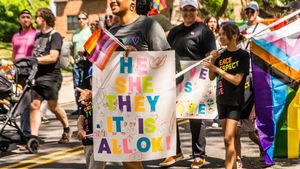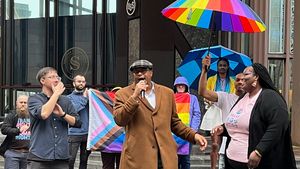All Rights reserved
By continuing to use our site, you agree to our Private Policy and Terms of Use.
Dear conservatives: Yes, Ancient Greece was gay as hell
Often, Ancient Greece is held up as one of the great pinnacles of society. It was a time when government and philosophy were thriving, when men were men, and when culture was great. It was also a time that was absolutely bursting with homosexuality.
Now that conservatives are all up in a tizzy about a new Netflix series called Alexander: The Making of a God because it shows famed warrior king Alexander the Great and his general Hephaestion kissing, we thought it would be a great time to remind everyone just how gay ancient Greece really was.
The End Wokeness X (formerly Twitter) account tweeted about the new show, complaining “Netflix made a new documentary about Alexander the Great. Within the first 8 minutes, they turned him gay.” When community notes pointed out that historians agree that Alexander had sexual relationships with men, End Wokeness replied, “It’s still unproven speculation and should definitely not be shoved into the first 8 minutes.”
Unfortunately for End Wokeness, Alexander was far from the only thing gay about Ancient Greece...
There were so many queer Greek gods.

Shutterstock
When it comes to being gay, the Greeks started at the very top, worshiping gods who often had same-sex relationships and liberal relationships with gender. Gods like Zeus, Apollo, Pan, Artemis, and Dionysus were known to take same-sex lovers, and there are many myths telling stories about it. Some of these mythological love stories include Thamyris and Hyacinth, Adonis and Apollo, Adonis and Dionysus, Artemis and Callisto, and Hermes and Perseus. The Greeks even had another god, Hermaphroditus, who is the origin of the term “hermaphrodite” and was both a man and woman in one.
Pictured: Apollo Belvedere statue from the Vatican museum.
The military was having all sorts of gay sex.

Shutterstock
The ancient Greeks believed that male sexual relationships and homoerotic bonds would strengthen soldiers’ morale for battle. One Theban military commander named Pammenes even organized his entire army around pairs of lovers. The Sacred Band of Thebes was a troop of 150 pairs of male lovers who formed an elite military unit that made the Theban army the most powerful in all of Greece, ending Spartan domination, for a whole generation.
Sappho

Shutterstock
Sappho, who lived around 630-570 BCE, is considered one of the greatest lyric poets of all time, and many of her poems were about her love for women. The word “lesbian” comes from the island, Lesbos, where she was born, and the term “sapphic” is based on her name. Her poem, Fragment 31, describes seeing a woman who is seated next to a man and how her “speaking sweetly and laughing delightfully” makes Sappho’s “heart flutter in my breast” and “it is as if my tongue is broken and immediately a subtle fire has run over my skin.” In “Ode to Aphrodite,” Sappho implores the goddess of beauty to help her as she loves a woman who doesn’t love her back.
Pictured: Portrait (fresco) of Sappho, Archaic Greek poet from Lesbos.
Achilles and Patroclus

Shutterstock
Achilles and Patroclus are two warriors in Homer’s The Iliad who are described as being the closest of companions. Throughout The Iliad, Achilles treats Patroclus with honor and reverence that he doesn't grant to anyone else. When Patroclus was killed by Hector, Achilles “falls to his knees, pours dirt over his head, and rips out his hair” and says “My dear comrade Patroclus has fallen - he whom I valued more than all others, and loved as dearly as my own life.” He also said “I will not live nor go about mankind unless Hector fall by my spear, and thus pay me for having slain Patroclus son of Menoetius whom I loved so dearly.” Later, Patroclus appears as a ghost to Achilles asking him “a last request - grant it please. Never bury my bones away from yours, Achilles, let them lie together.”
Pictured: Mosaic of Achilles and Patroclus from south-east Anatolia (mid-late 3rd century AD).
Alexander the Great and his male lovers.

Netflix
The real-life relationship between Alexander the Great and his general Hephaestion has long been compared to that of Achilles and Patroclus, even by Alexander and Hephaestion themselves. Hephaestion was described as “by far the dearest of all the king’s friends; he had been brought up with Alexander and shared all his secrets.” Aristotle described the two of them as “one soul abiding in two bodies,” and when Hephaestion died, it was written that Alexander “flung himself on the body of his friend and lay there nearly all day long in tears, and refused to be parted from him until he was dragged away by force by his companions.”
Alexander was also known to be bisexual, having three wives and several male lovers apart from Hephaestion.
Latest Stories
No closets here! Watch these LGBTQ+ films where no one has to come out
Jane Hilton's 'Cowboys & Queens' explores the modern American dream
All the 'Drag Race' queens on OnlyFans (& what they're showing)
Queens of Instagram! The most followed drag artists around the world
Murray Bartlett's 8 best gay roles in TV shows & movies
Experience Thailand: The ultimate LGBTQ+ paradise
Unleash your Capital kink at MAL Weekend 2025
No Pride flags needed in French Polynesia
Out and About with Karan Soni
8 of Jonathan Groff's best (and most iconic) gay roles
48 steamy celebrity Calvin Klein ads the gays won't forget
The future of rap is female and queer: 27 rappers slaying the game
All the LGBTQ+ (and queerish) characters in the MCU so far
Love is in the air! Unforgettable gay kissing scenes from TV & movies
Pedro Pascal is aging like a fine wine — as proven by these 32 pics
27 LGBTQ+ reality dating shows & where to watch them
HIV Is Not a Crime Day: Films about HIV & AIDS that you should watch
Virgin Voyages' Resilient Lady redefines luxury at sea
These queer icons show why they are the Real Nasty Pigs of New York
Get ready for pride on the slopes at Whistler Pride 2025
Trending stories
Recommended Stories for You

Mey Rude
Mey Rude is a journalist and cultural critic who has been covering queer news for a decade. The transgender, Latina lesbian lives in Los Angeles with her fiancée.
Mey Rude is a journalist and cultural critic who has been covering queer news for a decade. The transgender, Latina lesbian lives in Los Angeles with her fiancée.





































































